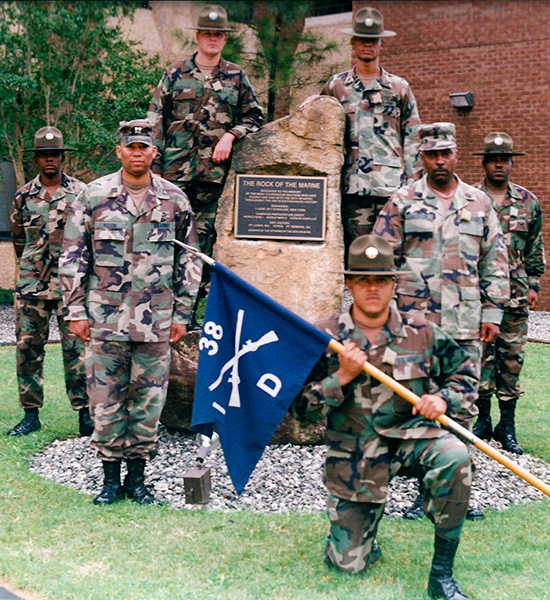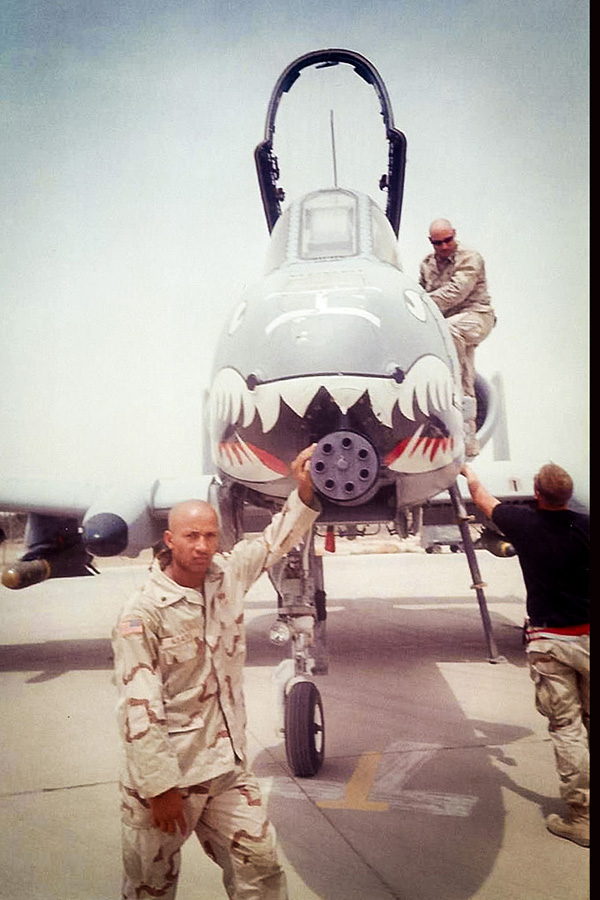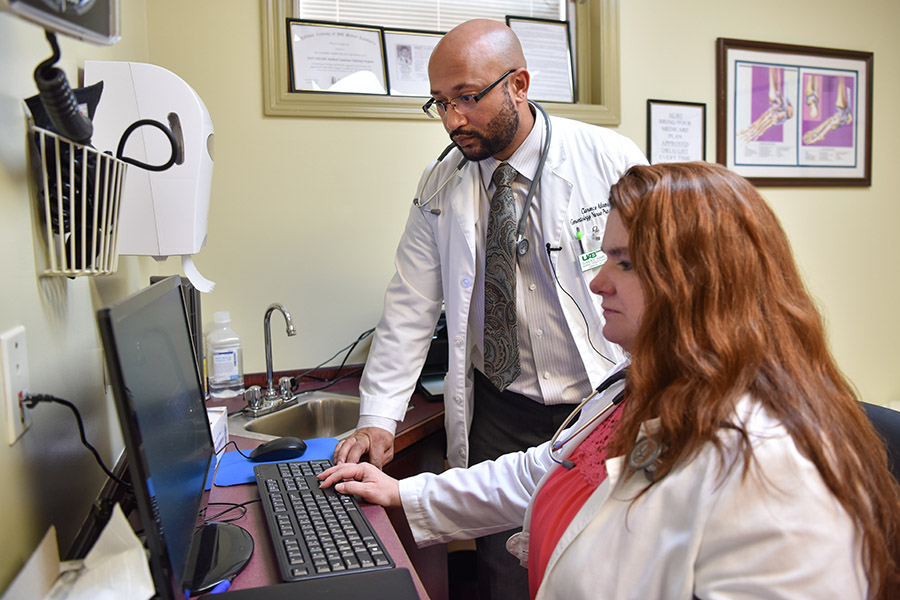After struggling through an advanced patho-physiology course in his first semester as a Master of Science in Nursing (MSN) student in the University of Alabama at Birmingham (UAB) School of Nursing’s Adult-Gerontology Primary Care Nurse Practitioner specialty track, Adams thought it best to step away from the program and come back down the road when his life was more settled.
When he told his friend and mentor, Assistant Professor Aimee Holland, DNP, CRNP, WHPN-BC, NP-C, RD, of his decision, however, he ran straight into a stone wall.
“I just said ‘no Clarence, I cannot let you quit,” Holland said. “I told him, ‘before you throw in the towel, let’s talk about why you feel that way.’ I knew he had it in him.”
Holland believed the hurdles Adams, who also is part of the Graduate Nursing Education Primary Care Scholars (GNEPCS) initiative that focuses on educating more advanced practice nurses to work in underserved areas and building networks to connect Alabama’s rural health care providers with one another and UAB, were not as daunting as he imagined. With that in mind, she asked Adams a few simple questions.
“I asked him, ‘What can we do to help you?’” Holland said. “I asked him, ‘How can I partner with you?’ and ‘What will it take to make this work?’”
With the support of Holland, Assistant Professor William Somerall, MD, and others, Adams remained in the MSN program, worked through his difficulties and, though still two semesters shy of his degree, is already making his mark on the landscape of rural health care statewide.
“He struggled with that first class, but he stuck with it and succeeded, and he has soared ever since,” Holland said. “It is a testimony to Clarence, and to the UAB School of Nursing and who we are.”
It was also not the first time someone who cared about his future refused to allow Adams to give up on himself.
A LONG, BUMPY ROAD
Growing up in Brooklyn, New York, Adams did not have the typical childhood. In his own words, he was a “troubled youth” with an abusive home life and an alcoholic parent. While other kids were shooting hoops or hanging out at Coney Island, he was often picking up odd jobs to support his mother and younger brother, and until his father left them, trying to avoid the frustrations the older man sometimes took out on his son.
His father had been a military man so, by association, going into the military wasn’t something Adams wanted to do. Until the day when, at 17 years old, he realized he had to consider all options if he and his family were to survive.
“One day I looked at my brother and said, ‘I’ve got to do something because we are not going to make it like this,’” Adams said. “So I took an Armed Services Vocational Aptitude Battery (ASVAB) test, and I got a really high score, I guess, because a lot of recruiters started coming around. The recruiters told me they would give me a $7,000 bonus if I would sign up for the military, and at the time that was more money than I could fathom. After that, I kept telling my brother, ‘We’re not going to have to worry. We’re going to be ok.’”
After enlisting in the U.S. Army through a delayed entry program, Adams quickly reached a crossroads in his military career during basic training at Fort Benning in Columbus, Georgia. The adjustment to military life had been difficult, and at least one drill instructor was pressing to have him dishonorably discharged.
 Adams will always be grateful to U.S. Army Drill Sgt. Johnson, holding the flag, for motivating him not to give up on himself and for spurring him on to a successful military career.That’s when another, Drill Sergeant Johnson, came into the barracks late one night, rousted him from his bunk and took him to the “Smoke Pit” where soldierly discipline was doled out in no short order. While putting Adams through a series of exercises, the instructor loudly -- and in colorful terms -- drove home his point.
Adams will always be grateful to U.S. Army Drill Sgt. Johnson, holding the flag, for motivating him not to give up on himself and for spurring him on to a successful military career.That’s when another, Drill Sergeant Johnson, came into the barracks late one night, rousted him from his bunk and took him to the “Smoke Pit” where soldierly discipline was doled out in no short order. While putting Adams through a series of exercises, the instructor loudly -- and in colorful terms -- drove home his point. “He was yelling, ‘You’re trying to find the easy ways to get out of life,’” Adams said. “He was like, ‘I’m not going to let you take the easy way out. I’m not going to give up on you like everybody else. You are going to learn to be a soldier, and I am going to make you a man.’”
With that oversight from a man whose first name he never knew – per Army tradition – Adams was able to restart his training. It was tough. Johnson rode him hard and worked him harder. If his unit was road marching with 50-pound rucksacks, Adams’ weighed 75. If the unit did a 100 pushups he did 150. Whatever everybody else was doing, Adams had to do more.
The result was that Adams graduated from basic training and went on to a very successful military career, including one combat deployment in Iraq on which he was wounded.
“A person saw something in me that I couldn’t see in myself and instead of doing the easy thing which was getting rid of me and moving on the next soldier, he decided to invest himself in me,” Adams said. “I will always be grateful for that.”
It also instilled in Adams a great desire to invest himself in others.
CALLED TO HEALTH CARE
Coming out of the military, Adams had no health care background at all. Basic combat-lifesaver training was the extent of any health care-related experience he gained in the Army. Still, something about the profession appealed to the sense of commitment and duty to serve woven into his soul by his military service.
He became a nurse in 2010, earning an associate’s degree from Calhoun Community College followed by his Bachelor of Science in Nursing (BSN) from Jacksonville State in 2012. Then came several years’ work as a bedside nurse in the Huntsville, Alabama, area. While fulfilling, Adams realized he wanted to do more to impact the lives of patients and their families, particularly those of the Veterans with whom he will always share an unbreakable bond.
He applied for and was accepted to the UAB School of Nursing to embark on a journey to become a nurse practitioner, but was still uncertain as to what exactly his specialty track would be. Then he met Holland at his orientation, and his life soon came into focus.
Holland quickly realized that Adams was a perfect fit for the Primary Care Scholars initiative with its emphasis on serving the underserved. She recommended he consider the rural outreach program, and he immediately knew he had found his calling.
“I have always had a strong desire to serve,” Adams said. “The UAB School of Nursing definitely cut on a floodlight for me and showed me the impact of what I can do for the community.
“I chose to go to UAB because I felt like it was on the frontier of health care with a program like this.”
AT HOME IN ALBERTVILLE
With the generous support of the Daniel Foundation of Alabama, a philanthropic organization that supports educational, health, humanitarian and cultural activities in Birmingham and throughout Alabama, the GNEPCS initiative was established to create a pipeline of nurses to and from rural counties who want to improve the quality of life for all Alabamians, especially those who have limited health care access.
 Growing up in Brooklyn, New York, Clarence Adams, shown here at Tallil Air Base in Nasiriyah, Iraq, had no idea how joining the U.S. Army and going into combat would change his life and lead him to find his calling in the health care profession.With 55 of Alabama’s 67 counties considered rural and 62 considered to be short of primary care providers, the health care shortage effects an estimated 1.6 Alabamians. It is into this fray that Adams has walked whole-heartedly and enthusiastically.
Growing up in Brooklyn, New York, Clarence Adams, shown here at Tallil Air Base in Nasiriyah, Iraq, had no idea how joining the U.S. Army and going into combat would change his life and lead him to find his calling in the health care profession.With 55 of Alabama’s 67 counties considered rural and 62 considered to be short of primary care providers, the health care shortage effects an estimated 1.6 Alabamians. It is into this fray that Adams has walked whole-heartedly and enthusiastically.As a complement to the initiative, the School now hosts a student chapter of the Alabama Rural Health Association (AHRA), GNEPCS scholars have attended the AHRA and National Rural Health Association (NHRA) annual conferences, and the Graduate Nursing Education Primary Care Scholars Summit has been established.
This annual event brings together clinicians, students and health care leaders from across Alabama to engage in a critical dialogue on overcoming primary care challenges for rural Alabamians.
It was at the 2016 AHRA conference that Adams first met Debbie Bonds, office manager for the Med-Assist Doctor’s Group in Albertville, Alabama, a community of approximately 21,500 located 50 miles southeast of Huntsville.
Through the course of the day and some conversations, Adams came to realize that the group’s Albertville clinic and an even smaller one in nearby Crossville (population 1,850) were exactly where he wanted to work, and he told Bonds so.
“I said, ‘Give me a call when you get to your clinicals, and we’ll see if we can precept you in our clinic,’” Bonds said. “He came to precept with us, and we certainly have enjoyed having him.”
Bonds knows first-hand the difficulties in persuading health care providers to locate in small communities. That is why she was so thrilled when Adams approached her expressing his interest.
She has been amazed at the impact Adams, who makes a 120-mile roundtrip from his home in Hazel Green, Alabama, to Albertville, has had on the physicians, staff and most importantly, the patients, in his short time at Med-Assist.
“The patients love him,” Bonds said. “He has seen both of my children, my husband and me, and everyone in my family said ‘I really like him. I hope you can hold onto him.’ I told them I hope we can, too.”
It comes as no surprise to Bonds that patients have already asked Adams when he’ll graduate and if he’s going to stay, and told him directly that they want him to remain their health care provider. It doesn’t surprise her because he comes from UAB.
“UAB produces excellent nurses, nurse practitioners and physicians,” Bonds said. “We have had really good results and really high-caliber, quality health care providers come from UAB.”
HIGH MARKS AND GOOD JUDGMENT
 Adams calls Niccole McDaniel, a three-time graduate of the UAB School of Nursing, an 'infinite source of wisdom' and is pleased to be working with and learning from her as part of his preceptorship with the Med-Assist Doctor's Group in Albertville, Alabama.Niccole McDaniel, MSN, ACNP-BC, FNP, is a three-time graduate of the UAB School of Nursing, having earned her BSN in 1997, her MSN-Adult Acute Care Nurse Practitioner degree in 2009 and her MSN-Family Nurse Practitioner degree in 2016. She also worked as a nurse and charge nurse in the Neurological Intensive Care Unit at UAB Hospital for 12 years where she provided medical care to many indigent and low-income patients.
Adams calls Niccole McDaniel, a three-time graduate of the UAB School of Nursing, an 'infinite source of wisdom' and is pleased to be working with and learning from her as part of his preceptorship with the Med-Assist Doctor's Group in Albertville, Alabama.Niccole McDaniel, MSN, ACNP-BC, FNP, is a three-time graduate of the UAB School of Nursing, having earned her BSN in 1997, her MSN-Adult Acute Care Nurse Practitioner degree in 2009 and her MSN-Family Nurse Practitioner degree in 2016. She also worked as a nurse and charge nurse in the Neurological Intensive Care Unit at UAB Hospital for 12 years where she provided medical care to many indigent and low-income patients. There she learned first-hand that providers often must adapt different approaches when treating low-income patients, knowledge she is now imparting to Adams.
“You use your clinical sense first before you order a whole bunch of tests that may be unnecessary and costly to the patient,” McDaniel said. “You rely more on your clinical instincts and judgment.”
Both are areas in which she gives Adams high marks.
“You can tell that his knowledge base is very good,” McDaniel said. “Some students I have to hold their hand through everything, but Clarence does a very good assessment and treatment plan. We sit down and fine tune it, but he actually helps me because he is so intelligent and such a good student. I’m very happy to have him here.”
Rommel C. Go, MD, a native of Queens, New York, has been equally impressed with the impact Adams has made in the clinic and the community.
“With his bowtie on, he looks more like the physician than me,” Go said with a chuckle. “People mistake him for the physician and me for his assistant. He’s very professional.
“Nurse practitioners have become a very integral part of providing good health care to everybody because we physicians cannot provide it all ourselves. Having Clarence working in our clinic to become a nurse practitioner that can practice in a rural health setting has been very helpful.”
IN TUNE WITH OUR VETERANS
Working in rural Alabama has also given Adams the opportunity to connect with many in the group for which he has a true passion – our nation’s Veterans. While he considers all his patients special, those who have served their country – particularly those like him who have seen combat – always receive a few extra minutes of his time.
“When patients present to the clinic I don’t really ever tell them I am a Veteran,” Adams said. “I appreciate their service, and I let them know that. I always tell everyone of them ‘Thank you for your service’ and that usually starts a conversation.”
Those conversations often allow him an opening to get a better feel for how a Veteran is really doing – inside and out. He might ask them if they are comfortable in their environments, if they have anxiety in crowds or if they are uneasy with people standing behind him.
His military experiences give him insights into the not-so-obvious health care needs of Veterans that other providers may not have because they don’t know what to look for. It also compels him to help as many Veterans as he can.
“I feel like God has set me in a situation where I can truly help those who mean so much to me,” Adams said. “Anybody who is willing to put up their right hand and swear an oath to defend this country against foreign and domestic enemies, that’s a brother or sister to me and my life force, and I will do all I can to help them.”
PLENTY TO BE THANKFUL FOR
Holland is well aware of Adams’ passion for Veterans, and fully expects that someday he will lead an initiative to address health care for those in rural areas who have served that will span the globe.
“I don’t know the road he has been down, but the fact that he has not let anything stand in the way of achieving his dreams is huge because he could have,” Holland said. “With all the things that could have possibly been a hindrance, he could have said ‘Why even try?’ But he stayed focused, he moved forward, and that speaks volumes for his character. He is certainly one of the shining stars here at the UAB School of Nursing and in the Primary Care Scholars initiative.”
Adams is simply thankful. He’s thankful for the opportunities he’s had in his life, and especially for those who have encouraged him and those who have never given up on him. He’s thankful for Holland’s kind words and her confidence. He’s thankful for finding the nursing profession, the Primary Care Scholars initiative and his place at the UAB School of Nursing.
As Thanksgiving rolls around each year, he reflects back on the many blessings he has to count.
“Knowing my background, everybody in the world could have given up on me and written me off,” Adams said. “To come from where I came from and achieve everything I have achieved, you can’t help but feel blessed.
“I’m very fortunate that Alabama has received me and allowed me to become a member of its community. I just hope when it’s all said and done that they can say ‘we gave you the opportunity, and we appreciate the way you gave back.’”
For more information on the Graduate Nursing Education Primary Care Scholars initiative, click here.